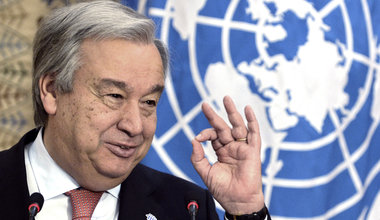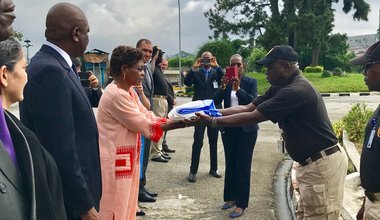PRESS REVIEW FOR THURSDAY, 17 JUNE 2010
UNOCI celebrates
International Day of the African Child
Le Jour Plus –
The United Nations Operation in Côte d'Ivoire (UNOCI), in collaboration with the
Korhogo section of the Association of Children and Young Workers, on Wednesday,
organized a ceremony to mark the International Day of the African Child
celebrated every 16 June, under the theme "Planning and including children's
well-being in the budget; a collective responsibility". Salif Boité of the
regional Human Rights office, on this occasion, read the message by Mrs. Agnès
kaboré Ouattara, Acting Chairwoman of the Experts Committee on Children's rights
and well-being. He underlined that "the signing of legal instruments for the
promotion of children's rights is a significant action that we positively
appreciate, we attach great value to their implementation which will improve the
well-being of the African child". (...) Effoli Benjamin, Secretary-General of the
Prefecture, said that a country that wants development should ensure education
for its children and youth. "A country that does not look after children does
not build its future", he added, reassuring that once the crisis will be
resolved, the governments which will follow each other will commit to prevent
education from being pushed into the background. (...)
Decrease in
customs' incomes – Mangly implicates UNOCI and Licorne
Le Nouveau
Courrier –
The customs administration is looking for the ways and means to increase its
incomes by establishing rules that considerably limit exemptions from customs
duties. The Ivorian customs office and all the corporations interested in
customs duties exemptions are in conclave since Wednesday in Bassam. The aim of
the working sessions which will last until 18 June is to regulate the
implementation of the "many texts" governing the exemptions from customs duties.
(...) a loss of 1,035 billion FCFA in income tax has been registered since 2005.
Today the situation is unbearable, the General Director complained, due to
increasing requests" from the institutions in Côte d'Ivoire in the framework of
the resolution of the military-political crisis. Especially the impartial
military forces: Licorne and UNOCI. "The massive presence of these forces and
the importation of heavy machines and various foods exempted from customs duties
and taxes does not help us", Alphonse Mangly explained (...)
After the
beginning of cantonment in Korhogo, General Mangou puts pressure
Le Temps –
After several missed appointments, Côte d'Ivoire can cross its fingers and say
"maybe this time will be different" for the disarmament and demobilization
process of ex-combatants and ex-rebels. (...) Korhogo set the tone last Tuesday by
carrying out the cantonment of 500 soldiers FAFN out of 1200 expected. (...) But
the process should be completed so that the peace process does not turn into an
unfinished symphony. The Chief of Staff of FANCI, who was in Korhogo, said it
clearly. It sounds like a warning or he is putting pressure on all the actors
involved in the process. (...) "As you said, it is the launching ceremony of the
cantonment of ex-combatants of the Armed Forces of the Forces Nouvelles. I have
already stressed during the generals' meeting that it should not just be a vain
experimental operation. It should be continued later", said the CEMA to
pro-government newspaper, Fraternité Matin. (...)
Disarmament Process: the murky
game of Gbagbo and Soro
Inter -
On Tuesday, June 15, 2010, the cantonment of ex-combatants of the Forces
Nouvelles' started, as announced in Korhogo. Out of 1200 soldiers only 500 have
been sent to the barracks due to lack of funds. The 700 others will wait until
the financial resources are available to join their brothers in arms. (...).
Thus, the eternal problem of money surfaced in the disarmament process which was
supposed to end two months prior to the presidential election. One must remember
that for the presidential camp the disarmament and the creation of a single
state treasury were the prerequisite to hold the elections. The paradox,
however, was that while the disarmament was required before the election as it
was written in the agreements, the government is not ready or does not want to
disburse the money required to perform this operation. If in the case of
Korhogo, it is difficult to find financial resources for only 1200 soldiers,
what will it take for the other three instructions groups? What is the future of
the remaining 700 ex-rebels after the cantonment of the 500? What is the exact
timetable for the other operations? These are the concerns of Ivorian people
that President Gbagbo and Prime Minister Soro must face. Their responsibility is
great because both of them co-manage the state treasuries. Gbagbo manages the
government treasury, and has no control over the treasury of the areas still
controlled by the Forces Nouvelles led by Guillaume Soro. The existence of these
two separate treasuries has always been an argument for the government to
justify the financial difficulties it faced in the implementation of programmes
to end the crisis. (...)
FPI in Crisis: How far will
Mamadou Koulibaly go?
Mandate
-The FPI is undergoing an
internal crisis. The crisis was increased by the declaration of the President of
the National Assembly, and the position of President of the FPI, Pascal Affi
N'Guessan. The leader of the Ivorian parliament is waiting for a strong signal
from the members of the parliament to initiate the moralization of public life.
This moralization will start without any doubt with Comrade Tagro who is accused
of fraud, favoritism in his department. However, Mr. Koulibaly has not won the
battle yet. If the President of the Parliament is supported by some of his
comrades and many Ivorians, a growing number of FPI militants consider Mamadou
Koulibaly's proposals unacceptable. Asking Mr. Tagro to face Parliament in order
to explain some of his actions, would mean a direct attack against the financial
and human resources of the presidential campaign of the candidate Laurent
Gbagbo. (...)
 ONU
ONU Nations Unies Maintien de la paix
Nations Unies Maintien de la paix



